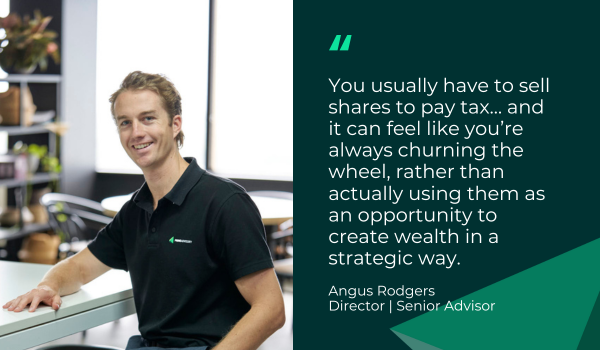Ever Wondered How Employee Share Scheme Tax Planning
Table of Contents
When it comes to Employee Share Scheme Tax Planning, it’s worth talking to an advisor with hands-on experience in what can often be a complex field.
Employee Share Scheme Tax Planning (ESS) used to be the exclusive domain of chief executives and other highly paid employees.
Today, however, businesses of all shapes and sizes offer an array of ESS options to employees across all levels of employment—often as an incentive to attract or retain talent.
It’s a proven way to drive employee engagement and ensure workers form a genuine connection with the company they work for.
But it can also be a complex field to navigate, which is why PrimeAdvisory’s own Employee Share Scheme Tax Planning specialist Angus Rodgers says it pays to talk to an advisor with real-world experience in getting the most out of an ESS.

A Key Point of Difference
“When I first started looking at Employee Share Schemes, I found clients had a limited understanding of their benefits and the industry wasn’t doing a great job of explaining them,” Rodgers said.
“No one really had a rock-solid plan around what to do with the shares, how to minimise tax, and what to do with the proceeds,” he added.
Rodgers says being inherently analytical is what drove him to develop a deep understanding of ESS and how they worked—and how to get the most out of them for his clients.
“A lot of people feel like they’re on the hamster wheel when they get these ESS options because they essentially create tax bills,” Rodgers said.
“You usually have to sell shares to pay tax… and it can feel like you’re always churning the wheel, rather than actually using them as an opportunity to create wealth in a strategic way.”
Understanding those tax rates and where best to place proceeds is key to maximising the benefits of any ESS offerings.
And having spotted a gap in the market, Rodgers says delivering expert ESS advice was a natural addition to the comprehensive range of financial services provided by PrimeAdvisory.
Custom Solutions for Any Scenario
With Employee Share Schemes now available to a broad spectrum of employees—from C-Suite executives at ASX-listed companies, to employees at start-ups, and even those collecting pay cheques overseas—Rodgers says there’s no one-size-fits-all solution for dealing with them.
A highly remunerated chief executive may be earning dividends worth $200,000 per annum through their ESS, for example, but see them taxed at the highest marginal rate of 47% without putting some considered tax strategies in place—such as moving the stock into a family trust or self-managed super fund.
Such strategies can help reduce the tax owed on any dividends by tens of thousands of dollars per annum.
Likewise, start-up employees who receive pre-IPO options that can’t be sold until the company lists on the stock exchange can never nevertheless save on future tax by employing strategies that see the shares taxed at the capital gains rate of 23%, instead of a much higher income tax rate of 47%.
It’s a complex world to navigate, but one Rodgers says can prove highly beneficial with the right advice.
“There are significant tax implications for those who participate in an Employee Share Scheme Tax Planning, he said.
“But with proper management and planning, and a long-term strategy for the shares as they vest each year, participants can benefit immensely from this form of remuneration.”
The High Price of Inaction
Given the relative complexity of Employee Share Scheme Tax Planning, Rodgers admits many who do participate in them often do so with a ‘set and forget’ mentality.
He also acknowledges that some employees are tempted to handle the tax side of things themselves—simply informing their financial advisor they’ve received a specific amount in proceeds, and usually paying more tax than they need to as a result.
“A lot of people just don’t want to deal with it,” Rodgers said.
“Some people have shares that vest and simply call up their advisor to say: ‘I’ve got $300,000 here, what do I do with it?”
It’s not a strategy Rodgers recommends.
“What we do here at PrimeAdvisory is we track everything,” he said.
“We track the tax, we track when the shares vest, we track what the financial result is going to be… and we essentially have a strategy for every possible outcome.”
It’s an approach that relies on experience and a base understanding of what’s strategically possible and one that sees plenty of clients turn to PrimeAdvisory for expert ESS advice and structure for family business
“I think the level of detail that we go into, and our base-level experience, is what really sets us apart,” Rodgers explained.
“One of the key things for me is helping clients understand their Employer Share Scheme so they feel empowered to make decisions around them, and not just have decisions made for them.”
Structured Advice for Strategic Outcomes
While Employee Share Scheme Tax Planning may seem daunting to the uninitiated, they remain an integral component of considered tax planning for many Australian workers.
For executives at the C-Suite level, no tax strategy is complete without an in-depth discussion around how best to handle ESS offerings and their myriad conditions—whether those offerings come in the form of large grants of options, Restricted Stock Units (RSUs), or performance rights.
With such a broad spectrum of conditions to consider and numerous strategies available, tax planning around ESS doesn’t simply begin and end with the shares themselves.
There are discussions around when to buy, hold, and sell to consider; opportunities to put the proceeds into super, investments, or even gifts to mull over; and simple day-to-day administration around how this may affect your cash flow.
In short, there are opportunities to provide valuable tax advice to anyone who participates in an Employee Share Scheme Tax Planning—even if no two scenarios are ever likely to be the same.
“I just don’t think anyone who runs an Employee Share Scheme Tax Planning, or the employees who are the beneficiaries of them, really offers a structured approach around how they’re administered,” Rodgers said.
“From the administration side of things, to formulating plans around what to do with the proceeds, to setting the right amount of money aside for tax… these are all the things that we provide.
“Along with the peace of mind that goes with knowing you’re making the right decisions—or at least, informed decisions, that you fully understand the implications of,” he added.
If it’s time to discuss your Employee Share Scheme Tax Planning options, you can reach Angus at an***@***************om.au








